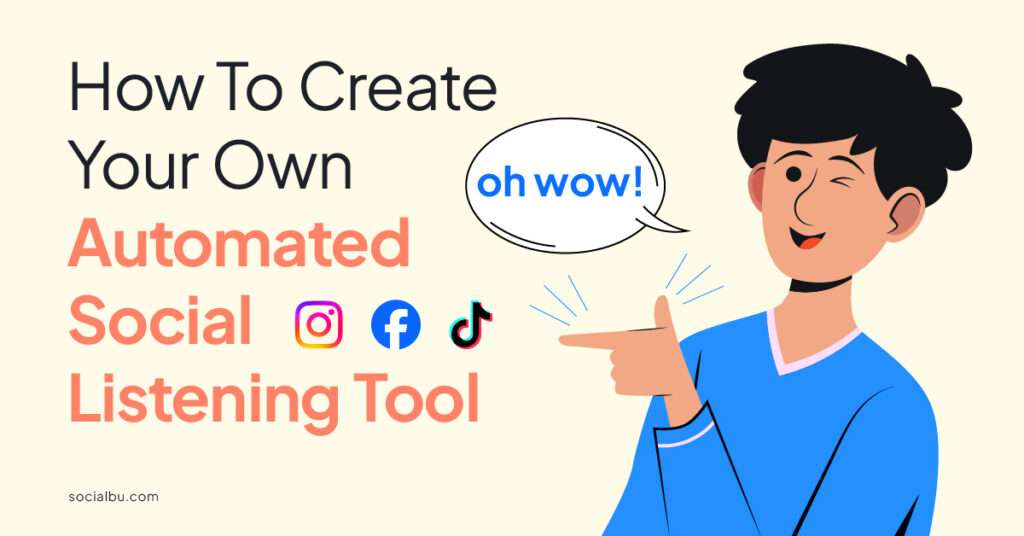In the age of digital marketing, knowing what your audience is saying about your brand on various social channels is more important than ever. This process, known as social media listening or monitoring, is vital for staying on top of public opinion and trends.
Social media monitoring tools are software designed to track, gather, and interpret relevant online conversations about your brand, competitors, and industry.
However, generic tools may not always serve a specific business’s needs. To overcome this limitation, you can build a social media monitoring software tailored to your brand’s unique requirements.
In this article, we will provide a comprehensive guide on creating your own automated social listening tool, analyzing its benefits and how it compares with existing free and paid options, and ultimately helping you make informed decisions about your social media strategy.
Comparison of Free and Paid Social Listening Tools
There are numerous free social media monitoring tools available, including SocialBu, TweetDeck, and Social Mention, allowing businesses to track social media mentions and analyze brand comments on social media.
These tools also provide capabilities for social channel and brand monitoring, serving as a comprehensive online media monitoring tool. Despite their many benefits, there are limitations to using free social listening tools. The primary drawback is that they often offer less comprehensive data and fewer features than paid versions.
Also, there may be data privacy and security concerns with free tools, as they may not have the same level of data encryption and protection as paid versions. In contrast, paid options often provide more advanced features, such as comprehensive social media monitoring and analytics, sentiment analysis, and a more in-depth social media monitoring report.
However, the choice between free and paid tools for social media monitoring will depend on your company’s specific needs and budget constraints.
Using Social Listening Tools
Social media listening tools are invaluable in monitoring brand mentions and online conversations. By tracking keywords and phrases, they offer insights into customer sentiment and feedback, helping businesses respond to both positive and negative comments.

Also, social media monitoring software can be used for competitor analysis, providing insights into competitors’ strategies, successes, and areas of improvement.
Furthermore, specific industries may find certain tools more valuable based on their unique needs and the platforms their target audience uses most.
Integrating other marketing and analytics platforms is another significant advantage of social listening tools, creating a streamlined, comprehensive digital marketing toolset.
Effective Social Listening Practices
Businesses should follow a few best practices when monitoring social media. These include responding to mentions quickly, utilizing analytics to track performance, and staying active on all relevant social media platforms.
Measuring the ROI and impact of using social listening tools is essential to understand their effectiveness. Metrics include increased engagement, improved customer satisfaction, or increased traffic to your website from social platforms.
There are numerous success stories of companies effectively using social listening tools. For example, using these tools, businesses have been able to respond to negative feedback swiftly, preventing potential damage to their reputation or uncovering new market opportunities based on customer suggestions.
Building Your Own Automated Social Listening Tool
Building your social media monitoring tool can provide tailored insights that are especially relevant to your business.

With a custom tool, you can monitor the social media landscape in a way that best suits your brand’s unique needs and objectives. Let’s delve deeper into the steps you can follow to create a custom monitoring solution for social media:
Define Your Objective
Clearly define what you aim to achieve with your custom tool. It might be to track brand mentions, monitor competitor activities, manage customer service, or a combination of these. The clarity of these objectives will shape the functionalities of your social media monitoring software.
Market Research and Social Media Analysis
Investigate what’s already available in the market. Explore free and paid social media monitoring tools, their features, functionalities, strengths, and weaknesses. By understanding what other tools offer, you can identify gaps your custom tool can fill. Analyze social media trends and behaviors to refine your tool’s features further.
Decide on the Features of Your MVP
Using your objectives and research, decide on the essential features for your Minimum Viable Product (MVP). These might include:
- Social media listening and tracking: The ability to track specific keywords and phrases across different social platforms and online media like blogs and forums.
- Sentiment analysis: Identifying whether the brand mentioned is positive, negative, or neutral.
- Reporting and analytics: Generating detailed media reports and analytics that help understand the performance of various metrics over time.
Determine the Platforms to Monitor
Determine which social media platforms you want to monitor – Facebook, Twitter, Instagram, YouTube, LinkedIn, Pinterest, and more. Each platform may require different methods for data extraction, so it’s crucial to identify these upfront.
Select Your Development Approach
You have two main options: to develop in-house or to outsource. If you have the technical expertise and resources, in-house development allows for greater control over the process. Otherwise, outsourcing to a professional development team can ensure a high-quality end product. Nowadays, IT outsourcing to Latin America and Eastern Europe is really popular for various types of projects.
Development Phase
It is the phase where you’ll build the software. Your development team will use various coding languages and software programs to create your social media monitoring platform. They’ll ensure it’s user-friendly, functional, and visually appealing.
Testing
Testing is crucial to ensure your tool functions as intended. Test the tool across various scenarios and use cases to ensure reliability and effectiveness. In development environments involving Java, incorporating java integration testing helps validate that different modules work together seamlessly, reducing the risk of system failures.
Feedback and Iteration
After launching your MVP, gather user feedback to understand its effectiveness and identify areas for improvement. Iterate and update based on this feedback, continuously refining your tool to meet your objectives better.
Integration with Other Tools
Consider how your social media listening tool can integrate with other marketing and analytics platforms you use. Seamless integration will provide a more holistic view of your digital marketing efforts.
Update and Maintenance
Technology and social media landscapes evolve rapidly. Regular updates and maintenance are required to ensure your tool remains practical and relevant. Implement changes in social media algorithms, add new features, and continuously improve user experience.
Developing a custom social listening tool might seem challenging. Still, with a strategic approach, it can significantly enhance your social media monitoring and analytics capabilities, providing you with unique insights into your brand’s social media presence.
Conclusion
Social media monitoring is a vital practice in today’s digital age, whether it’s for tracking brand reputation, customer sentiment, or competitor activities.
Free tools can provide valuable insights, but creating a custom social media listening solution allows for better customization, ensuring all your specific needs are met.
Whether you use free tools or decide to build your own, the important thing is to get started. With the massive importance of social media in today’s business landscape, having an effective social media monitoring tool in place is a significant advantage.
Remember, social media monitoring isn’t just about tracking. It’s about listening, understanding, and responding in a way that promotes your brand’s growth and customer satisfaction.







